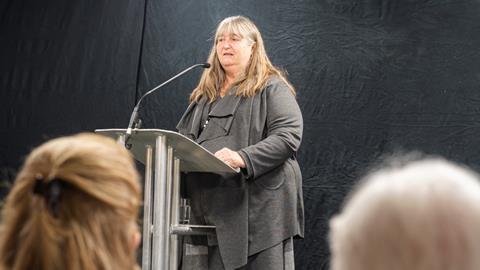The new chief legal adviser to the Welsh Government has signalled that justice devolution is still on the agenda - but given no details about how and when it might happen.
Giving a keynote speech one month after becoming counsel general for Wales, Julie James MS (pictured above) said she would be a ‘champion for devolution and if it is needed I will be an enemy to its erosion’.
But her talk at the Legal Wales conference in Haverfordwest today featured no commitment to a timescale or a structure for transferring justice to the Welsh Government, despite an ongoing commitment.
‘Of course, the Welsh Government has a longstanding ambition for the operation of Welsh justice system to be managed in Wales, as is the case in Scotland and Northern Ireland,’ said James. ‘I believe we will take steps in this direction in the coming period. In particular, the new UK government has manifesto commitments to work with us to explore the devolution of youth justice and probation.’
The speech appeared to add little to previous statements from the Welsh Government following the landmark Thomas Commission report by former lord chief justice Lord Thomas of Cwmgiedd, which recommended that Cardiff assume full control of justice policy and funding from London.
Earlier this year, James’ predecessor Mick Antoniw told the Gazette that he was optimistic that a Labour government would be more sympathetic to devolving justice. But he left the post in the summer and there remain questions about the speed at which the process is moving.
James said relatively little about devolved justice but was keener to talk about the importance of lawyers and her role in protecting them from criticism that should instead be directed at politicians.
‘In recent years we have seen the shameful spectacle of UK governments seeking to disrespect both individual laws, and the law more generally. Ministers have preached flagrant disregard of rulings from so-called “foreign courts”,’ she said.
‘Schemes like Rwanda or proroguing parliament have been put forward, in contempt of the basics of democracy and the rule of law. And too often those were accompanied by criticism, on or off record, of our judiciary and our lawyers. I have seen lawyers painted both as corrupt game players and as lefty woke campaigners.
‘With a former human rights barrister as prime minister, that page has now hopefully been turned. But there are still those out there who would paint the law, and lawyers, as an enemy to British values somehow.’
James added: ‘If there is a problem with the law, it will be with what politicians like me have decided to write into it – not with how lawyers like you have applied it. No lawyer should be criticised for pursuing their client’s interests.’
This article is now closed for comment.




























3 Readers' comments